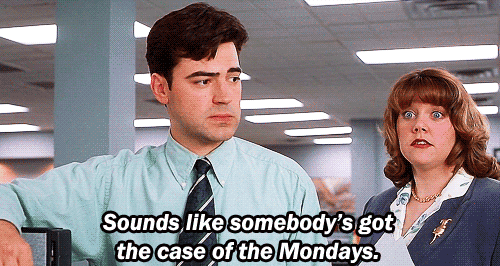A Guide for Employers: The Importance of Holidays
Earlier this month – Monday 6th February, to be exact – saw the nation embrace National Sickie Day. This coincided nicely with the Brexit white paper that accidentally claimed that British workers are entitled to 14 week holiday. These twinned occurrences got us thinking. How much does a holiday allowance affect an employee’s work? Would holidays affect a job offer? If not enough holiday days are on offer, have people ‘pulled sickies’ in order to get more time off?

Warner Bros. Television
So we did our research! We sent out a poll asking a couple of questions about holidays and sick days, and received quite a lot of responses.
Holiday Packages
Our respondents get an average of 24.13 days holiday per year, with the lowest holiday package being 16 days, the highest 35, and most workers falling in the middle at 25 days. However, they also thought that an average of 26.12 days holiday was a reasonable annual package, with the lowest still at 16 days, the highest at a considerably higher 40, and most of the answers falling, again, square in the middle at the 25 days. Given the legal minimum entitlement for UK holiday, 25 days holiday is a fairly generous package. 25 days also seems to be an industry norm (though some of those days may be allocated to Christmas). So 26.12 days would obviously be more generous still.
It’s only a small difference, but this discrepancy of two whole days’ holiday between the averages of how much holiday employees get and how much they think is reasonable is interesting. Most respondents answered 25 to both questions, but there’s certainly a slight trend towards thinking that more holiday is reasonable.

ITV Studios
The Prevalence of Pulling Sickies
Almost a quarter (24.19%) of our respondents have taken a sick day because they didn’t have enough holiday. This actually ties in with national findings on this topic. This 2014 poll found that 20% of workers would fake illness to get out of work on a Monday – and a further 15% would consider it.
There are articles full of advice for dealing with employees who have pulled sickies having been refused holiday (taking the denied time off as sick), or taking a sick day at the start or end of an agreed holiday. Tips include taking pre-emptive action by speaking to the employee about rumours that they are planning to take a sick day, holding a return-to-work meeting with the employee, and to not be afraid to instigate a disciplinary process if necessary.
Similarly, suggestions abound on how to prevent employees pulling sickies in the first place. First among these is approving employee morale with implementing perks and reward systems, improving company culture and the physical office environment, introducing flexible working, and increasing the company holiday package. Of course, these are going to be very dependent on your means as a company!

Judgmental Films
That’s Great, But Do These Ideas Work?
Some of these ideas may seem token or gimmicky – but they really can work. Companies have found that giving employees an extra day off – such as paid holiday on their birthday – results in ‘an immediate drop in sickies’.
Another potential solution to this problem is for companies to include duvet days as part of their holiday package. This doesn’t seem to be too popular with employers, however, since only 4.84% of our respondents are offered them.
Our suspicion is that duvet days are perceived as being part of the trend of fun but ultimately gimmicky soft benefits (like an office pool table or beer on a Friday). However, duvet days actually seem to do a service to companies. Research conducted in the USA, where duvet days originated back in the 90s, reported that some companies have managed to cut absence and sick days by around 40%. After all, if you accept that faked sick days are inevitable, then why not simply ‘make them official?’
But, of course, smaller companies aren’t really in a position to offer them because of the increase in workload that would result for the rest of the team. And, logistically, they do present problems to employers, even in larger companies.

Walt Disney Productions
Holidays Are Really Pretty Important
Lastly, and most significantly, it turns out that just over a quarter of respondents (25.81%) have turned down a role purely on the basis of the holiday package, and nearly a quarter of respondents (22.58%) believe that the holiday package is more important than the salary.
These two statistics really show how crucial good holiday packages can be. Basically a quarter of people believe that holidays are of higher value than salaries, and would turn down a role – and have done so – on the basis that the holidays offered weren’t enough.

Paramount Pictures
Holiday allowance is clearly more important than many give it credit for. A quarter of people, give or take a percent or two, would pull a sickie to have more days off. A quarter would turn down a role if the holiday package wasn’t good enough. And a quarter believe that holidays trump salaries – that’s pretty significant!
Benefits and holidays are important. If you’re offering an employee the same money as another company, it will come down to the benefits – possibly even if you’re offering more money. If a candidate or an employee tells you that they’re leaving or not accepting an offer because of the holiday package, listen to them! Don’t let your holiday package be the reason you lose an excellent (potential) employee.